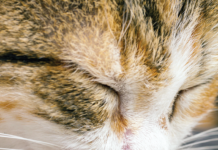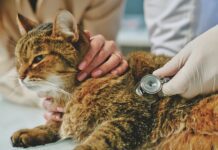Caring for cats would be so much easier if they could just tell us when they are sick. How do you determine whether your cat needs immediate medical attention or if she can wait until you can get an appointment with her veterinarian? Nishi Dhupa, BVM, director of emergency and critical care at the Cornell University Companion Animal Hospital, says you have to look for signs that your cat is not feeling well.
The most important thing an owner can do is to err on the side of caution, Dhupa says. If you think it is an emergency, call your veterinarian and explain the situation. He or she will help you figure out what to do. It is also important to know how to contact your veterinarian after regular office hours. Not every emergency will happen during daytime hours.
Making the call
When you first call, your veterinarian will ask a series of questions and give you some guidelines by which to determine whether your cat is in a crisis. Together the two of you will decide whether your cat can wait until morning to be examined.
Some injuries obviously need prompt attention, such as bleeding with or without an obvious wound injury. A cat that has been hit by a car or has been in a fight should see her veterinarian immediately. If the pupils are different sizes and there is evidence that the head was hit, you should consider it an emergency, Dhupa says. If there has been trauma, the sooner you get her to the veterinarian the better.
Likewise, call your veterinarian if you suspect your cat has been exposed to poison or a dangerous plant. Most people dont realize that Easter and Stargazer Lilies (and many others) are extremely toxic to cats. Simply chewing on some lilies can cause irreversible kidney damage and death if not treated quickly. If you suspect that your cat has ingested a toxic plant or other poison, immediately call your veterinarian; he or she may also consult the ASPCA Animal Poison Control Center at 888-426-4435. This is not a free service (a $45 flat fee is charged to a major credit card), but it can save your cats life.
Know your cat
Dhupa says that other than those obvious cases, the best way to decide whether you have an emergency is to be familiar with your cat. Really get to know her unique traits and habits. For example, how often does she eat and drink? If she suddenly starts eating less or drinking more, waste no time in looking into it. How often does she use the litter box, and what does her normal stool and urine look like? If you see blood in her urine or her stools become runny, take her to her veterinarian. Are her gums a healthy pink color? They should be.
Know how much your cat sleeps normally. If she is sleeping less than usual, call your veterinarian to discuss her change in habit. Likewise, if she is sleeping excessively and not responding normally, promptly take her to her veterinarian.
Mental response is important, Dhupa says. Is she alert? Is she responding to sounds such as the opening of a food can or the squeaking of a toy?
Look at your kittys breathing when shes calm and relaxed. Is it fast or slow? Count the number of breaths she takes in a minute, and then jot this information down and put it in a convenient place; doing so could help you make a lifesaving decision later — when a deviation from your cats norm could indicate a serious condition.
Waste no time getting medical attention if she is breathing with an open mouth, struggles to breathe, or is breathing rapidly. This is when your records of a healthy respiratory rate come in handy. The breathing rate and amount of effort required to breathe are both critical, Dhupa says.
When you shouldnt wait
One cant wait issue is a urinary tract blockage. Your cat may have an obstruction if she spends a lot of time on the box and nothing is coming out, seems distressed, or cries while trying to urinate, Dhupa says. These symptoms could be a simple urinary tract inflammation, but they could also indicate a deadly blockage. Dhupa says that difficulty in urinating, accompanied by vomiting and lethargy, raises the level of alarm.
If you believe she is not acting right, check to see if she is dehydrated. If her gums are dry and sticky instead of moist and pink and if you can pick up loose skin and it doesnt snap back, she is most likely dehydrated. While dehydration is a concern in all cats, it is more serious in the very young and the very old.
Watch out also for sudden paralysis of one or both back legs. This could be indicative of heart disease.
When a medical emergency occurs, every moment counts. Your own powers of observation and immediate action can help your cat stay safe and healthy.



